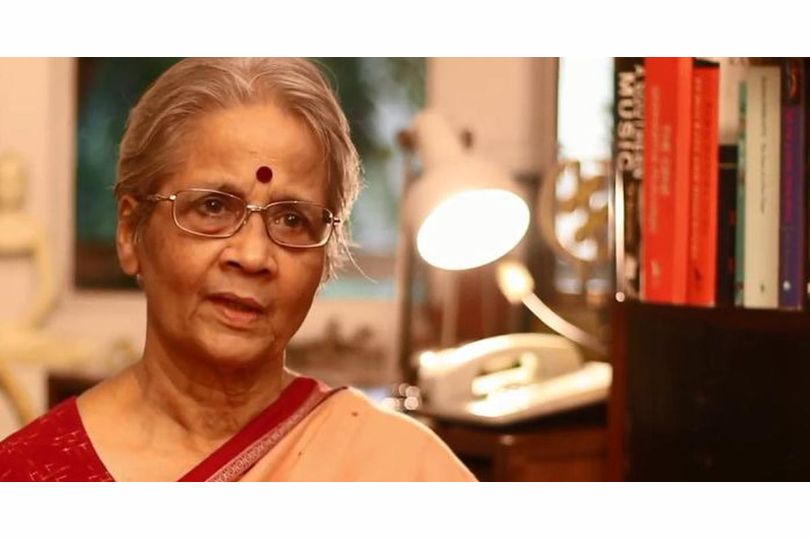Shanta Gokhale on becoming a translator: "Authors are great, translators are not"
on Jul 18, 2022

The Sahitya Akademi award for Laxmibai Tilak's "Smritichitre" in English was awarded to Shanta Gokhale in 2021.
My talk's official title is "The challenges and rewards of translation," but I've changed it to "The goddess in my puja room" in an effort to make it seem more interesting and pique curiosity in the goddess and the location of the puja room. Constance Garnett, the translator who lived from 1861 to 1946 and translated roughly 70 volumes of Russian literature into English during that time—some of which I read as a child and possibly you did as well—as the goddess in the puja room of my thoughts.
Garnett had no prior exposure to the language. She needed the help of a Russian immigrant to translate. But she eventually became weary of the arrangement, learned Russian, traveled to Russia (where she actually met Leo Tolstoy), and started translating on her own.
The least I can do in genuflection is to place her in my puja room. When I was 13 years old and its theme was far apart from my experience with life, I read Crime and Punishment by Dostoevsky. If despite that, I found myself engrossed, Garnett's translation is to be praised.
At the time, I pictured her as a frail, austere woman who spent her days and nights typing away in a grotto while everyone else slept. It turns out that the typewriter was not archaic in the image. By 1900, when Garnett was 29 years old, The Underwood No. 5 had established itself in homes and workplaces. That wasn't how Garrett operated, though.
She is "sitting out in the garden cranking out reams of her beautiful translations from Russian," according to her friend DH Lawrence. Without looking up, she would finish a page, toss it in a pile on the floor, and begin a new one. This pile would be extremely tall, nearly reaching her knees, and completely miraculous.
And me? Although I've translated manually using a fountain pen, ballpoint pen, and three progressively more sophisticated typewriters, I've spent the last thirty years working happily at a computer. Despite this, the sheets haven't piled up to my knees on the floor next to me, metaphorically speaking. I can't even say that the close-set style of Marathi literature is to blame for the strain on my eyes because I don't know how the Russian volumes Garnett had to read were set, and anyway, it appears that she was already partially blind before she started translating.
The fact that Garnett's recent struggles must have given us a sense of camaraderie if her production and working style isn't enough to put translators like me to shame. In my case, a certain Mr. Dam once discarded in the pages of an upcountry Sunday newspaper a collection of three Premanand Gajvi plays, of which I had translated two.
I rejected the review in the same manner, but my distressed editor felt obligated to protest on Facebook that Mr. Dam had criticised the translations without providing any justification and had done so in poorly constructed sentences, which he was more than eager to point out as examples.
Garnett's translations have been severely criticised by critics of greater stature than Mr. Dam. Earnest Hemingway vowed that the depth and accomplishment he saw in the Russian writers as translated by Garnett was like having a great treasure offered to him, and Ezra Pound claimed that without Garnett, the nineteenth-century Russians would not have been such a profound influence on early twentieth-century American literature, but Vladimir Nabokov called her translation of Anna Karenina "a complete disaster."
According to Joseph Brodsky, English-speaking readers are unable to distinguish between Tolstoy and Dostoevsky because they are not reading their respective works' sentences. The author Constance Garnett is being read.
That can be seen as praise by certain translators. Tim Parks, a British author of 14 novels who also translated works by Moravia, Calvino, Calasso, and Machiavelli, is one example. Who wrote the Milan Kundera you love? is the first line of his translation essay in The Observer. Michael Henry Heim is the reply. What about the Orhan Pamuk whom you consider to be so intelligent? Margaret Freely Or the intellectually imaginative Roberto Calasso? Oh, yeah, that was me.
If someone told me that a writer I had translated sounded like me, I would be really upset. The objectives and principles of translation have evolved over time. Today, we make an effort to preserve as many of the textual, syntactic, and rhythmic aspects of the original text as we can in our translations. Garnett lived in a different era. Because of this, I consider Tim Parks' arrogance to be wrong as well as Nabokov and Brodsky's criticism of her work to be ahistorical.
Authors are authors. Translators are translators. Authors are great. Translators are not.
Whether you interpret Moravia or Machiavelli, if you can't handle that hierarchy, they will sound like Tim Parks. As a result, the translator yields to the original author's voice while yet carrying writerly pride. She doesn't replace the first in any way. She permits herself to be possessed by it.
Smoothing out the rough edges would imply drowning out the author's true voice if the original text's author writes with a rough edge and purposely breaks some norms of grammar and syntax. Instead, the translator must expand the bounds of her language to incorporate that voice. She might even improve her language in the process.
The possibility provided by translation, according to Walter Benjamin, "is not a defensive one: to preserve, to embalm, the present state of the translator's own language." Instead, it presents a chance to let a foreign language shape and alter the language into which work is being translated.
I would assert that when I translated Gieve Patel's play, Mister Behram, into Marathi, I had achieved that goal. In the play, Patel employs formal, manufactured vocabulary. His dialogue is not realistic. He is constructing a formal barrier between speakers in a classical-modern conversation.
Depending on the plot, the language employed in modern Marathi theatre is either realistic, conversational, or "poetically" heightened. Aiming low, I might have been able to transform Patel's distinctively inflected prose into something more in line with what my audience was used to. But instead of seizing the chance to "impact and modify" Marathi, that would have been "embalming the current status" of the language.
I would assert that when I translated Gieve Patel's play, Mister Behram, into Marathi, I had achieved that goal. In the play, Patel employs formal, manufactured vocabulary. His dialogue is not realistic. He is constructing a formal barrier between speakers in a classical-modern conversation.
Depending on the plot, the language employed in modern Marathi theatre is either realistic, conversational, or "poetically" heightened. Aiming low, I might have been able to transform Patel's distinctively inflected prose into something more in line with what my audience was used to. But instead of seizing the chance to "impact and modify" Marathi, that would have been "embalming the current status" of the language.
Translators are often asked the question. “Does your choice of language depend on the readership for which you translate?”
The questioner wants to know if we focus more on the American or British reader when translating. Some linguists might. I don't. I don't translate for a certain audience of readers, regardless of where they are located. In Nabokov's article on the art of translating, he says that I don't "planish and pat a masterpiece into a vilely beautiful shape" to "conform to the notions and prejudices of a given public." According to Nabokov, such behaviour is criminal and falls under the third category of translation turpitude, for which the appropriate punishment is "should be punished by the stocks as plagiarists were in the shoe buckle days."
Brodsky argues that discarding words and phrases that you don't understand and not allowing yourself enough time to look them up is a crime. As much time as original writing is needed for translation. When I have a deadline looming over my head, I find it very challenging to interpret. How can you be sure there aren't any traps in the original text?
I have devoted days to researching the English equivalent of a dialect word or phrase after spending days trying to understand its meaning. The image of Garnett completing sheet after sheet of translation makes me wonder if, as some critics have said, she skipped words and even entire phrases in her haste to meet deadlines.
I have been very picky about the novels I have chosen to translate because I am not endowed with Constance Garnett's prolific vigor or, in fact, the press of publishers that came knocking on her door. "By literary translation we mean, we may mean, the translation of the small fraction of published books truly worth reading: that is, worth revisiting," Susan Sontag states in her St. Jerome Lecture on Literary Translation. I'll contend that an accurate assessment of literary translation as an art is fundamentally a defense of the worth of literature. The goal of translation, or as she puts it, "the evangelical motive," "is to increase the circulation of a book considered to be important."
I have chosen to translate only such books as are important landmarks in Marathi literature and have been reread or deserve to be reread over time.
The autobiography Mee Durga Khote by Durga Khote, the novels Dhag by Uddhav Shelke, Achyut Athavale ani Athavan by Makarand Sathe, the articles on art Kora Canvas by Prabhakar Barve, and plays by Mahesh Elkunchwar, Satish Alekar, G. Deshpande, Vijay Tendulkar, Premanand Gajvi, Shafaat Khan, I'll also translate Laxmibai Tilak's Smritichitre and Sane Guruji's Shyamchi Aai in the future for the same reason.
At the risk of seeming self-important, I'll acknowledge that my motivation for translating comes in part from "the evangelical incentive." The reason why I find it amusing when strangers call me and ask me to translate their books by saying, "My buddy so-and-so gave me your number and recommended you for translating my book," is because they are usually unknown.
I now fall under the category of a grocery store. "So-and-acquaintance so strongly recommends your papads," Could you please mail me a packet? It is considered that once you become well-known as a translator, you have established yourself and are through with life.
When I get such requests, I respectfully but firmly decline. However, there will always be some difficult people who will not accept a polite no. One such person thought I would seize the chance to translate his book if I just laid eyes on it. One afternoon, he brought the book over and placed it in front of me with a flourish. It has to do with his business management style.
I brought him tea and biscuits and remarked, "Nice." He ought to have been on alert after that. Not at all. I've sold thousands of copies in Marathi, he remarked after he had read the book's amazing contents and expressed his ideas to me. In English, it will sell millions. You'll achieve fame. Here is my business card. Contact us so that we can talk about your rate. It costs ten rupees per page, I'm told. That brings the total for this book to 2,000. No issue. No issues at all. You've left your book behind, I replied as he stood up to depart. He finally understood the message.



.jpg)






.jpg)

.jpg)
.jpg)
.jpg)

.jpg)
.jpg)

.jpg)








Sorry! No comment found for this post.